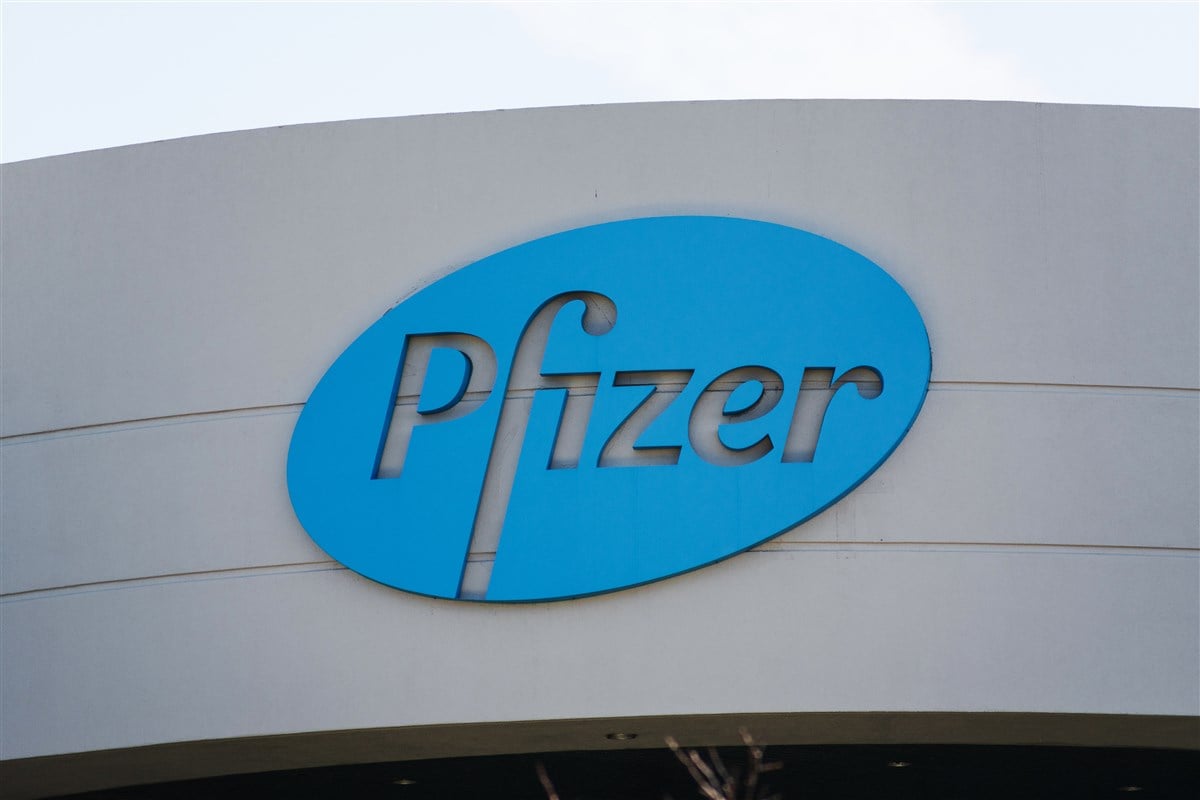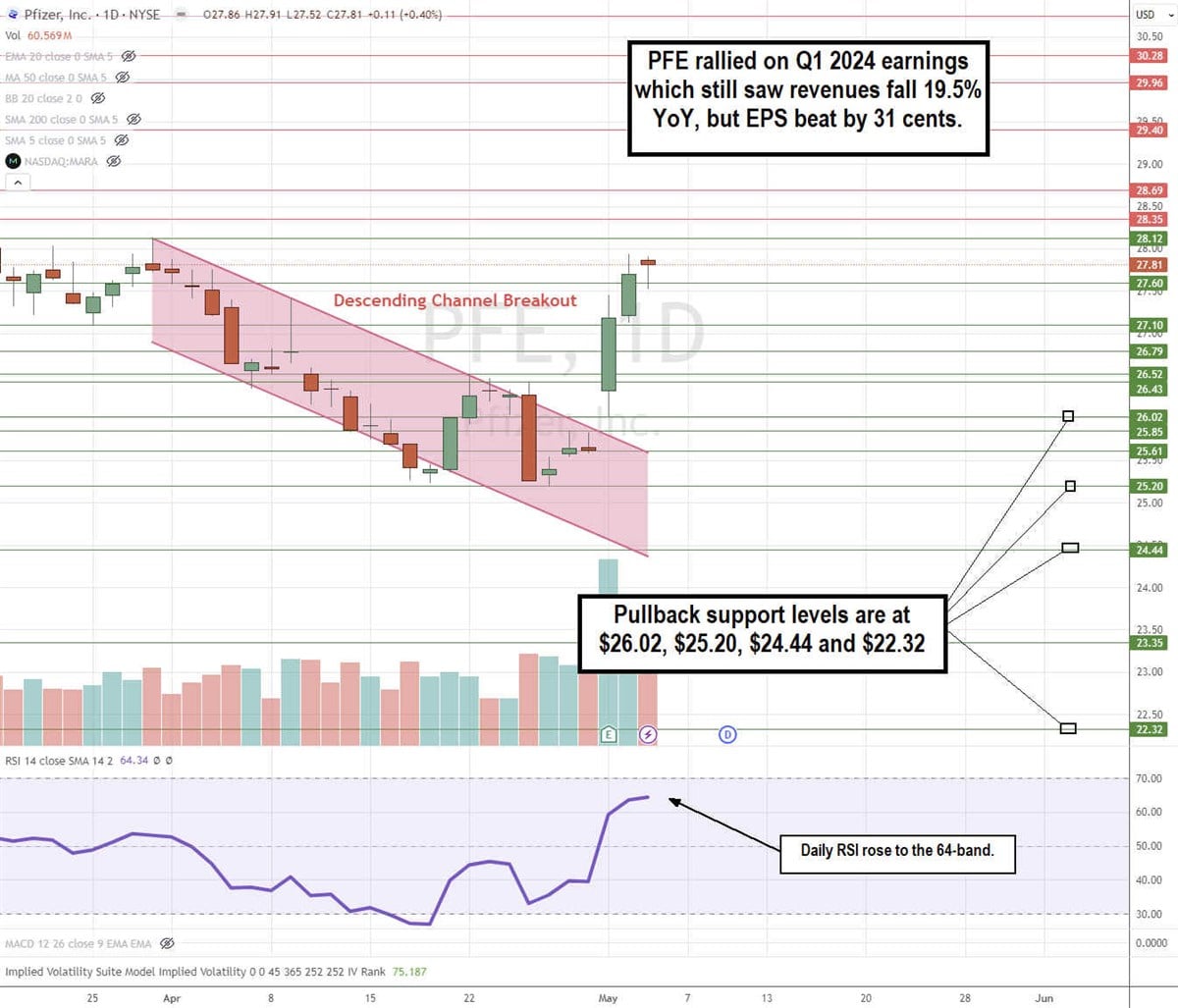
Biopharma giant Pfizer Inc. (NYSE: PFE) has given back all its COVID gains and more. Shareholders have sat through a painful two-year selloff from the stock's $61.71 high on December 20, 2021, to its swing low of $25.20 on April 26, 2024. The medical sector company may have finally gained a foothold after reporting a solid Q1 2024 earnings report.
The COVID pandemic was quick to lift shares of vaccine makers to mind-boggling heights but sold back down in a slow knife-twisting, gut-wrenching manner, as evidenced by the performance of Moderna Inc. (NASDAQ: MRNA), Johnson & Johnson (NYSE: JNJ) and Novavax Inc. (NASDAQ: NVAX).
The Turning Point
[content-module:CompanyOverview|NYSE:PFE]Pfizer shares surged 6% after its Q1 2024 earnings report. The company has been experiencing normalization as its COVID-19 vaccine sales have been and continue to plummet. Its Q1 2024 revenues dropped 19.5% YoY. The U.S. government returned some of its Paxlovid treatments, which impacted EPS by 11 cents. By any accounts, a nearly 20% YoY revenue drop is bad news. However, in Pfizer's case, the quicker COVID-19 sales of Comirnaty and Paxlovid fall and plateau, the better it is for investors. Paxlovid sales dropped 50% YoY to $2 billion, and Comirnaty sales plummeted 88% to $354 million.
Non-COVID Revenues Rising
A look at the operational revenue growth of 11% is a sign of strength among the rest of its portfolio of drug treatments. Its traditional brands in the Prevnar and Vyndaqel lines are perking up again. Its cancer drugs are experiencing a rebound, including Padcev, Xtandi and Ibrance. Its non-COVID drugs added $12.5 billion to the top line. Pfizer CEO Alberta Bourla stated that its non-COVID product portfolio had strong performance, including an 11% rise in oncology product revenues.
A Value Play
Pfizer has been curtailing costs as the direct costs to sales ratio fell to 22.7% from 26.4% in the year-ago period. The company still expects COVID treatments to generate $8 billion in 2024 revenues, with a spike expected during the year-end flu season. Pfizer is an appealing candidate for value investors as the stock trades at just 11.64X forward earnings and has an annual dividend rate of 6%.

Daily Descending Channel Breakout
PFE formed a daily descending channel breakout pattern thanks to its Q1 2024 earnings report. The parallel descending upper trendline formed at $28.12 on March 28, 2024, is capping bounce attempts at lower highs. The parallel lower descending trendline form connects the lower lows. Shares hovered near 52-week lows into the earnings report, which gapped up shares to $26.02 as they continued to grind higher for the following days. The daily relative strength index (RSI) rose to the 64-band. Pullback support levels are at $26.02, $25.20, $24.44 and $22.32.
Solid Q1 2024 Results
Pfizer reported a Q1 2024 EPS of 82 cents, beating analyst estimates by 31 cents. Revenues fell 19.5% YoY to $14.88 billion, crushing the $13.87 billion consensus estimates by nearly $1 billion.
Raised Previous Forecast Guidance
Pfizer provided full-year 2024 EPS guidance of $2.15 to $2.35, up from earlier forecasts of $2.05 to $2.25 versus $2.21 consensus estimates. Full-year 2024 revenues are expected to be between $58.5 billion to $61.5 billion versus $59.94 billion. The company is on track to deliver at least $4 billion in annual net cost savings by the end of 2024.
Focus Intensified on Treating Cancer Patients
Pfizer CEO Bourla said Pfizer reached 119 million patients in the first 3 months of 2024. Pfizer is focused on reaching world-class oncology leadership, expanding margins by realigning its cost base, and maximizing the performance of new products while delivering its next wave of pipeline innovations. Its treatment for recurrent or metastatic cervical cancer Tivdak received full FDA approval. It is also the first antibody-drug conjugate (ADC) to have positive overall survival data for patients who were previously treated for cervical cancer.
Bourla was emphatic about the strong focus on its oncology products, "Going forward; we are guided by a strategy focusing on our greatest opportunities to make a difference for patients with cancer… we are confident we are well on our way toward our 2030 goals of doubling the number of patients treated with our innovative cancer medicines; increasing the number of blockbuster medicines in our portfolio from 5 today to 8 or more; and, driving an anticipated tenfold increase in the proportion of revenue from biologics."












